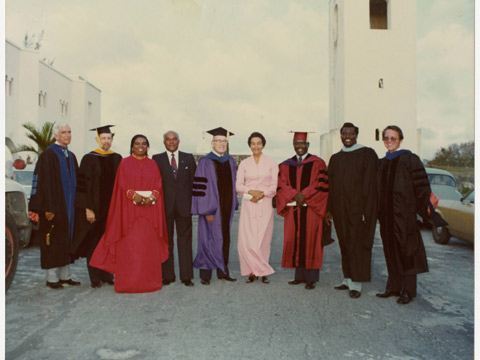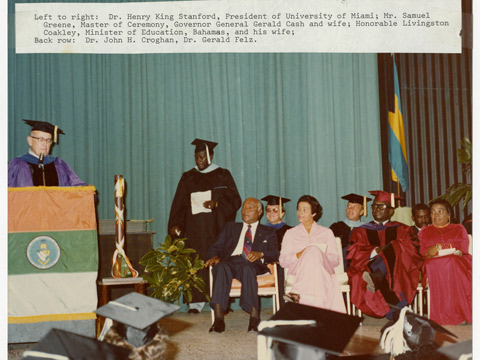As the Bahamas continues to assess the damage from Hurricane Dorian and get help for the injured and homeless, many organizations and communities in South Florida have stepped up to provide assistance. Bahamians have strong ties to South Florida, and essentially played a major role in the development and settlement of Miami.
You do not have to look too far to learn about the Bahamian influence in Miami—just minutes away from Coral Gables lies the city of Coconut Grove — a place where Bahamian influence is prominent.
“The story of Coconut Grove tells us that there was a close collaboration between the Bahamian people that migrated there and the people who moved from the Northeast,” said Beatrice Skokan, head of Manuscripts & Archives Management and curator of Caribbean Collections at the Otto G. Richter Library.
One of the remarkable photos available in the digital collection of UM Libraries is a portrait of Bahamian migrants standing in front of the home of American yacht designer and early resident of Coconut Grove, Ralph Munroe. His house, known as The Barnacle, is now a historic state park, and is considered the oldest home in Miami-Dade County still standing in its original location.
“The photograph illustrates the early pioneers of Coconut Grove. According to the text, these were people who worked at the Peacock Inn, one of the first hotels in the Grove, “she said.
Stories of Monroe and his ties to Bahamian pioneers can be found in the Monroe Family Papers, which can be explored in the UM libraries’ digital collections. The collection includes hundreds of letters, diaries, household accounts, journals, and photographs.
Robin Bachin, history professor and assistant provost for civic and community engagement said Bahamians began settling in what became Coconut Grove during the late 1800’s as Miami began to develop.
“Bahamians were some of the first settlers in what would become Miami and helped create the city as we know it today,” she said. “For example, black Bahamian workers built some of our most treasured landmarks in Miami, including Vizcaya."
Skokan believes UM is playing an essential role in preserving this important local history.
“The preservation of archives is important because people who are interested in Coconut Grove history and Bahamian culture can come to the library and learn about stories that would normally not cross their path, “said Skokan. “In the case of some communities, their historical contributions remain unknown and their stories are always in danger of being erased. We all know the Grove is being gentrified, so part of what we try to do is to create partnerships in the community to preserve the history of all its people.”
One of the many treasures the library houses is The Theodore R. Gibson Family Papers, which document the life and work of Reverend Gibson, longtime Miami Commissioner during the 1970s and 1980s, and champion of Black Coconut Grove. The collection also contains materials documenting the civic activities and interests of Reverend Gibson’s wife, Thelma Gibson, who is a University of Miami trustee emerita.
Skokan considers herself to be a curator of people’s stories. “We take care of these prized stories, listen to the people telling them, and make them available to the general public. Part of the process as a librarian is to build trust, and care for a person’s testimony.”
 While sifting through the University Archives, Skokan also came across a photo that further showcased ties between the Bahamian islands and the University community. One of the photos she discovered featured a graduating class of the University of Miami Bahamas Program. Another photo of the graduation featured former UM President Henry King Stanford presiding in the 1978 commencement ceremony.
While sifting through the University Archives, Skokan also came across a photo that further showcased ties between the Bahamian islands and the University community. One of the photos she discovered featured a graduating class of the University of Miami Bahamas Program. Another photo of the graduation featured former UM President Henry King Stanford presiding in the 1978 commencement ceremony.
“We have so many connections to the Bahamas. They are like South Florida’s family members. We have the historical connections, the personal connections, and the firsthand knowledge of what it’s like to go through hurricanes, so we have the empathy and understanding of what they are going through right now,” said Skokan.

For more information on how to help the Bahamas visit https://welcome.miami.edu/uresponds/
Learn more about University Archives here: https://www.library.miami.edu/

